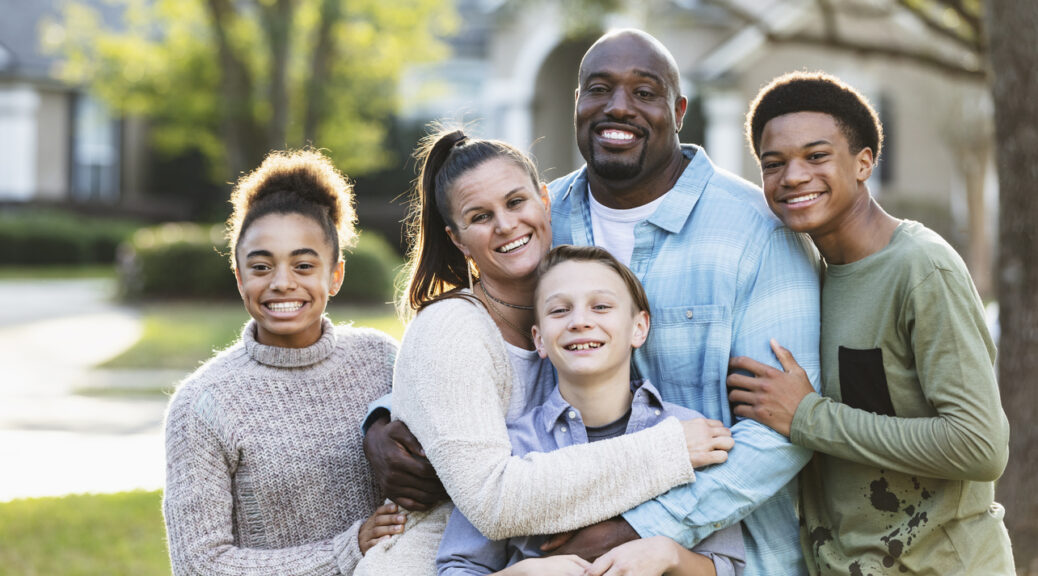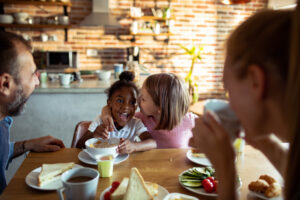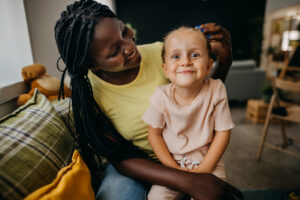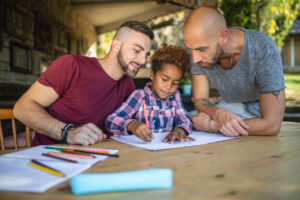The Emotional Journey of Adoption from Foster Care: Navigating Loss, Attachment & Bonding

Adoption is something to celebrate: it represents a child being welcomed into a safe, secure and loving home. There’s no denying the fulfillment caregivers feel as they provide for a child. But joy is only one of the many emotions those going through an adoption journey experience. Caregivers and children both experience a fair share of ups and downs during the process, and this rollercoaster can be a challenge.
November is recognized as National Adoption Month, and it’s the perfect time to explore the emotional journey of adoption. Whether the experience of adoption is viewed from the perspective of the biological parent, the adoptive family, or the child, it is clear that the journey involves a range of emotions. Join us as we look at the emotional side of adoption: what it’s like to navigate loss, prepare for adoption and build secure relationships in the wake of trauma.
Navigating Loss: The Birth Parents
Navigating loss is part of adoption, and the pain of that loss is sometimes overshadowed. Regardless of the specific circumstances surrounding the adoption, biological parents often move through an adoption grief process, which can be full of emotions and may be challenging to manage. Whether it’s an infant adoption or the adoption of an older child, the emotions of the biological parents can range from:
- Denial: Coming to terms with the reality of adoption can be difficult. Reaching full acceptance can take time, but it’s essential to process through and take steps to move forward.
- Anger and Sadness: Part of the processing entails working through feelings of anger and sadness. Anger often looks like an overwhelm of emotions in the body. In cases of adoption, the feeling of helplessness is common as well.
- Guilt: Many parents feel a sense of guilt about no longer being their child’s primary caregiver.
- Fear: Biological parents may realize the benefits for their children to have opportunities for a better future outweigh their fears about the adoption. However, that doesn’t keep them from having concerns and asking questions like, “Will the adoptive family love the child as much as I would?” Or “How do I know the adoptive family is a good family?” They may also worry about what their own future looks like without the child in their everyday life.
Adoption circumstances are different for every child and every biological parent. But there’s no denying the grief experienced, as adoption represents a significant loss.
 Preparing for An Adoption from Foster Care: The Adoptive Families
Preparing for An Adoption from Foster Care: The Adoptive Families
Reunification is the ultimate goal in the majority of foster care cases. Studies illustrate that reunification with biological families is often in the child’s best interest and can improve overall permanency results for parents and for children. However, reunification is not always possible.
Some adoptions can result from a kinship or foster care relationship. In these situations, the child or children have already been placed with either a kinship caregiver or a foster family, and they have begun building a relationship. According to recent data, 50,000 – 60,000 children are adopted each year in the United States. Of those, 55% are adopted by their foster caregiver and 34% by a relative (kinship caregiver).
While finalizing an adoption, both foster parents and kinship caregivers feel a range of emotions including hope, anxiety, excitement, eagerness and frustration. The process can sometimes happen in fits and starts: sudden momentum in some situations, with lots of waiting in others.
 This can be a worrisome experience, especially given all the unknown variables as custody is finalized. The federal standard is for children to be adopted less than 12 months from when they are legally free to be adopted and within 24 months of entering foster care to minimize this period of instability for children.
This can be a worrisome experience, especially given all the unknown variables as custody is finalized. The federal standard is for children to be adopted less than 12 months from when they are legally free to be adopted and within 24 months of entering foster care to minimize this period of instability for children.
With the change and transition from birth parents to adoptive parents, emotions run high, all while remaining sensitive to the feelings of the birth parents and the child. Once the adoption is official, the lifelong journey of healing trauma, bonding and forming healthy attachments begins.
Bonding and Healthy Attachments in the Wake of Trauma: The Adopted Children & Teens
From the child’s perspective, adoption brings with it a rollercoaster of emotions. Between the loss of their biological family, the time spent in kinship or foster care and the unknown future, children may feel scared, alone and unsure of what’s next for them. Most children of adoption, even very young children, will have at least one major break in their attachment bond and could have more, depending on their history. In addition, children may carry a mental representation of their previous relationships with caregivers and any trauma into their relationship with adoptive families. This may form an immediate challenge for close bonding. But the good news is adoptive caregivers can provide support and security leading to a successful secure attachment.
Healing trauma, bonding with new caregivers and learning a secure attachment style takes time. It will call for patience and empathy from adoptive families. To encourage positive growth, adoptive parents can become a safe place for their children and foster a secure attachment by:
- Staying consistent with parenting styles
- Tuning into the child’s needs: physically, emotionally, mentally, socially and otherwise
- Providing appropriate structure and routines
- Giving recognition to strengths and celebrating even small “wins”
- Maintaining a positive outlook even during tumultuous seasons
- Seeking out mental health resources if they’re struggling
- Helping the child stay connected to their roots. If possible, support them in maintaining and building relationships with biological family members. Encourage them to engage with their culture. This can help them develop their identity and cope with feelings of loss.
And you don’t have to do it alone, community resources are available to adoptive families. Groups like the Kansas Post Adoption Resource Center provide educational resources and group meetings.
Adoption is an emotional journey for children, biological caregivers and adoptive caregivers alike. Here at KVC Health Systems, we know that no matter what, we all need connection. From support through the adoption process to mental health services, we’re here to help. Find a KVC location near you.






